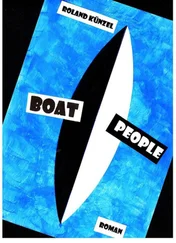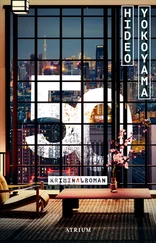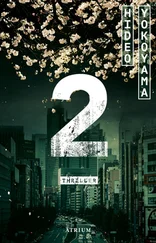The automated train pulls into Shinbashi Station, stops there for a few minutes, then heads back to Ariake again. But I don’t wake up—because I’m already somewhere else.
There. In that dream.
Back in that “room”.
The one in my memories. That hotel room. I wake up same as last time. I wake up as a character in that world . Am I seeing things from the same angle? Just off the ground? Hard to say. But I’m back in that cabriolet, same as last time. It feels like I’m living the scene over and over.
It feels the same—but it’s not.
Last time, I was leaning back in the chair. This time, I’m leaning forward. Like I was when I fell asleep on the train. Like… like I broke through the wall just like that. The thick wall that divides reality and dreams.
Channel your senses, I tell myself. Get a good look at the place.
This world. This “room”.
Where’s the CD? Back on the desk—like last time?
I know it’s important. I can feel it in my bones. I train my eyes, and there it is. The yellow jacket. The man with the saxophone: Sonny Rollins. The dust is thicker now—like the volume’s been turned up. Is time moving? Is the “room” getting older? I grab the CD from under the dust. Déjà vu. I take the dream’s generous gift in my hands. I’m surprised by how thin the case is—same as last time.
I flip it over. White letters on black background. Same thirteen tracks as before. In the same order—at least I think so. Which means, I reason, this CD really exists. It still begins with “The Stopper” and closes with “I Know”. But only one track jumps out at me (even though I don’t know why—not yet). It’s the same one that brought me back from sleep on the stalagmite. “On a Slow Boat to China”. It overpowers the other titles—all of which begin to blur.
“On a Slow Boat to China”.
I let the words sink in. “Slow”, “Boat”, “China”. Right—I can feel the story they’re making. That’s what pulls me in.
I get out of the chair.
Where am I?
Look around.
There are parts of the “room” I still haven’t seen. Like, where’s the door? And where’s the bathroom? They have to be around here somewhere, right? Over here? Beyond the left side of the desk—a carpeted hallway. This new part of the “room” comes into focus. I see the door. I head right for it. I want to open it and get out of this place…
I grip the knob, but it won’t move.
It’s like a wall made to look like a door. Like a fake door. Is it fake?
Maybe. But it won’t get me down. I had a feeling it wouldn’t be that easy. My history is called up . I’ve known doors like this before. Doors I tried to open—only to be yanked back, beaten senseless. My past knows what the future holds. It asks: What if the door won’t open? Are you gonna lose your shit?
Nope. I tell myself: This isn’t the way out. Calmly.
I don’t have any emotions in the dream.
The bathroom’s next to the door. I take a look inside. Tiny. The shower curtain has lost most of its colour, like the dull coat of an old lion. There’s the toilet. Lid down. Next to that, the sink. The mirror is murky. I can’t even see my own reflection.
A sign by the faucet, written in red: DON’T WASTE PRECIOUS WATER.
I turn to head back to the desk, but—right when I turn around—I can see that something’s changed. Something small, but significant. On the other side of the chair, there’s a round table that I’m sure wasn’t there before. I get closer. There’s an ashtray on top. Full of dust—no butts.
I don’t smoke.
This is a weird table. It’s weirdly low… and the legs are screwed to the floor. To keep it from moving.
Looks like neither of us are going anywhere.
All of a sudden I feel tired, so I lie down on the bed. I’m looking down at my feet when I feel it. The vibrations. What’s shaking? The floor? Maybe the bed? It’s constant—but without rhythm. Almost like perpetual motion.
No, it’s not the bed. Not just the bed.
Everything’s vibrating now. The ceiling, the walls, the floor. The “room”.
Or maybe it was always vibrating. Maybe I just didn’t notice.
I look up at the ceiling.
Is this place really a hotel? Whatever this “room” belongs to. Whatever it is, it feels like it’s changing. Because I caught on.
It’s forming. I can feel it.
That’s where I wake up.
I wake up.
The train is about to arrive at yet another final stop—Ariake Station. I don’t see any other passengers around. I try to get my bearings, but I have a hard time wrapping my head around falling asleep in a dream and waking up in “reality”.
I’m not shaking any more. Thanks to the heater.
Maybe I’m still forming, too.
But what does that mean?
A homeless girl on TV dared us to give her money. May 9: Mandela was named President of South Africa. “The Surgeon’s Photo” of the Loch Ness monster was revealed to be a hoax—sixty years after the fact. In Matsumoto City, Nagano Prefecture, eight people were killed by an unidentified gas. Kansai International Airport opened on a man-made island in the Seto Inland Sea. Sept. 20: Ichiro (playing for the Orix Blue Wave) notched his 200th hit of the season.
THE TROPIC OF CAPRICORN (OR “THE END OF THE LINE”)
By Kaku Nohara
In the end, it was the underground loop. The Marunouchi Line.
Our Tropic of Capricorn. The line the sun hangs over on the winter solstice.
Masuo Hashiguchi poses the question: “Where’s our Tropic of Capricorn?”
I answer: “Has to be the line where we dump our trash.”
“Huh?”
“Think about it. Yotsuya… Mitsuke…”
Nothing but blank faces .
I take a deep swig of canned coffee (BOSS, to be specific). What a pain to explain. All right—here goes.
The five of us were in college. We spent freshman year drinking and singing and chasing girls. But not sophomore year. We were sick of cheap booze, karaoke was repulsively mainstream and—thanks to semi-permanent girlfriends—our chase was on hold, for the time being.
Shigeru Kaji: High time we found another way to have fun…
Me: High time?
Takeru Igarashi: We’re sophomores now. We’re in the big time…
Hisashi Iwata: But our girlfriends eat up all our cash.
Me: The price of courtship…
Hashiguchi, Kaji, Igarashi and Iwata all nod.
Shopping was never our bag anyway. So—what else could we do for kicks?
Work. That was the answer to our prayers. Nothing beats short-term employment. You can choose what you want to do, and every workplace comes with its own discoveries (varies from person to person). Best of all, you get paid. Talk about the ideal hobby.
Sophomore year. The five of us landed jobs.
Different jobs doing different things in different places.
But our work hours weren’t all that different.
We always met up on the way to work. Mid-commute, in a subway station. At first, our rendezvous was Akasaka Mitsuke Station. It’s well connected—it has the Ginza and Marunouchi Lines. I had to get to Honancho on the Marunouchi Line (switching or not switching trains at Nakano Sakaue). Akasaka Mitsuke was on the way. Pretty much every morning from August to September, we met up in Mitsuke. To share an underground breakfast before heading to work. Proof of our friendship. Whenever a girlfriend prepared something for one of us, we split the spoils five ways.
Читать дальше












